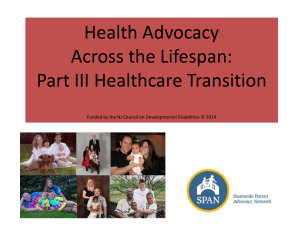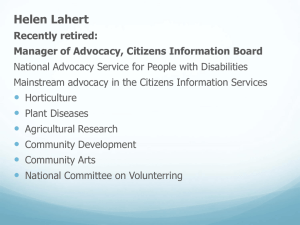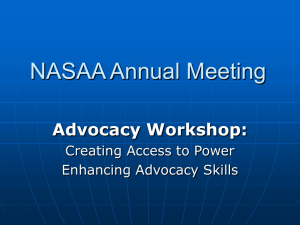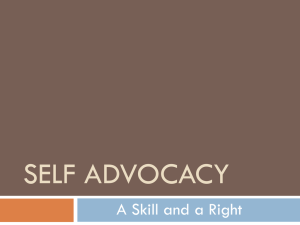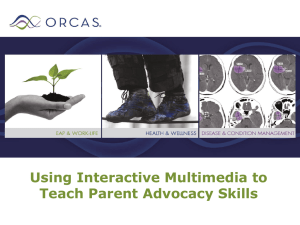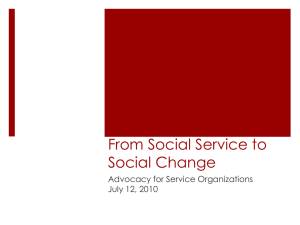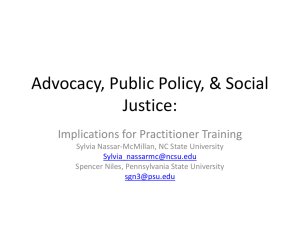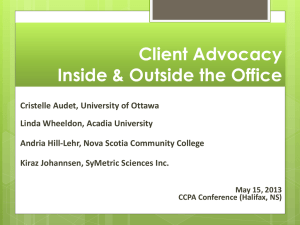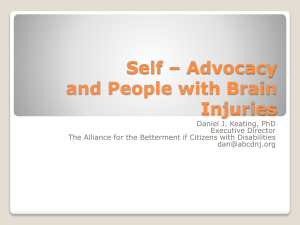Developing Healthcare Advocacy Skills
advertisement
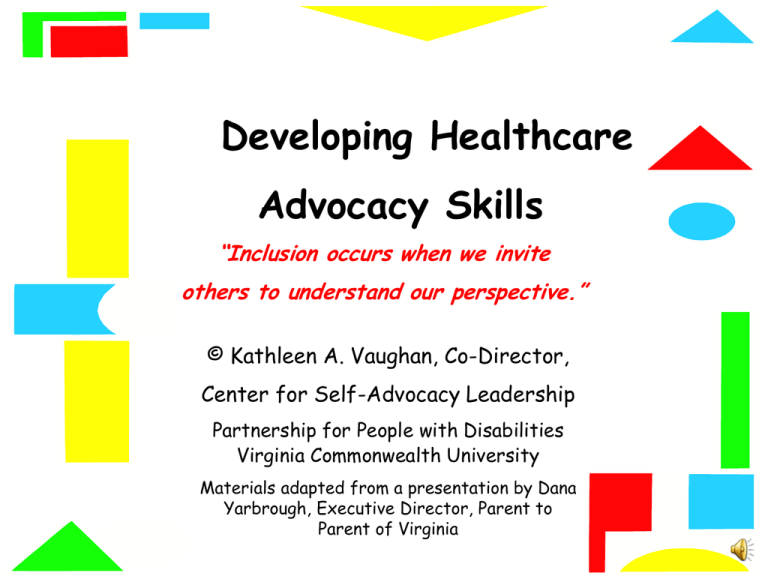
Developing Healthcare Advocacy Skills “Inclusion occurs when we invite others to understand our perspective.” © Kathleen A. Vaughan, Co-Director, Center for Self-Advocacy Leadership Partnership for People with Disabilities Virginia Commonwealth University Materials adapted from a presentation by Dana Yarbrough, Executive Director, Parent to Parent of Virginia Developing Healthcare Advocacy Skills The Basics of Advocacy How to Communicate with Professionals for yourself and others Developing Communication Skills We must recognize that not everyone providing services has the benefit of our perspective. Effective communication conveys respect for the individual and the legitimacy of their concerns. To do this, we must become effective advocates. The Basics of Advocacy Advocacy means speaking out Advocacy involves great thought and preparation Facing the need for advocacy involves great emotion and important decision making Effective advocates are confident, motivated, knowledgeable, and tactful Self-Advocacy 1. 2. 3. 4. 5. You are the best qualified to assess your own needs You have the right to be treated with dignity and respect You have the right to make your own decisions You are responsible for your own welfare You have the right to the best healthcare available Supportive Advocacy 1. 2. 3. 4. 5. Your are supporting an individual’s rights This is a privilege that bears great responsibility It is your role to collaborate with the individual in communicating their priorities and concerns Involving individuals in the advocacy process promotes independence and their capacity for self-advocacy By demonstrating advocacy, you are a role model for the individual Advocating for a Service 1. 2. Identify the need or the problem Gather data to document the need or problem 3. Identify decision-makers 4. Gather support 5. 6. Develop recommendations to address the need or problem Make the case Common Advocacy Mistakes 1. 2. 3. 4. 5. Failing to effectively communicate needs to healthcare providers Taking an “all or nothing” approach Not being willing to try a service or program Focusing on unproductive approaches in the healthcare process Not documenting everything Healthcare is a Team Endeavor * Communicating with healthcare professionals 1. 2. 3. 4. The healthcare process is collaborative Each team member brings important knowledge and information to the process Maintain realistic expectations of service providers Trust is based upon mutual respect and equality 5. Open communication is essential 6. Respect individual and cultural preferences 7. Diplomacy fosters constructive solutions Developing Negotiation Skills 1. 2. 3. 4. 5. Differences of opinion are inevitable Negotiation is not about getting your way or about conceding priorities Negotiation is about reasonable compromise that furthers mutual goals Negotiation is based on equality and common purpose The most important trip you may take in life is meeting people half way Developing Organization Skills *Effective Advocacy Requires 1. Preparation 2. Communication 3. Mutual Respect 4. Realistic Expectations 5. Collaboration Organizing for Effective Advocacy Ask the healthcare provider about side effects and adverse reactions to new medications Disclose your allergies and current medications in case of potential drug interactions Maintain a contact list of healthcare provider staff; know who to call for specific issues Maintain comprehensive personal healthcare records Know your insurance coverage Community Resources Partnership for People with Disabilities/VCU: 1-828-828-3876 http://www.vcu.edu/partnership/ Virginia Board for People with Disabilities: 1-800-846-4464 http://www.vaboard.org/ Virginia Office for Protection and Advocacy: 1-804-225-2042 http://www.vopa.state.va.us/ Virginia Bureau of Insurance 1-800-552-7945 http://www.scc.virginia.gov/division/boi Senior Navigator: 1-804-827-1280 www.seniornavigator.com


